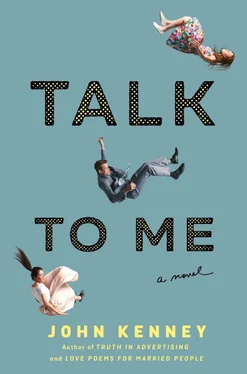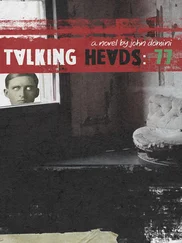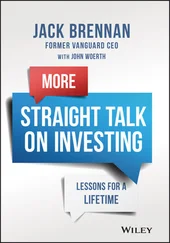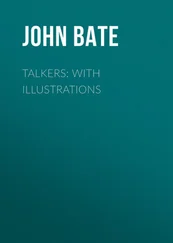Sitting atop the credenza in a row, the framed photos of Ted Grayson, famous person. Franny leaned forward, examining them. And there, toward one end, in an elegant, tarnished old silver frame with Claire’s initials etched at the bottom, was a photo of Claire and Franny at Claire’s parents’ place on Cape Cod. A place called Sandy Neck on Barnstable Harbor. The old lighthouse and the house next to it had been in Claire’s mother’s family since it was built, as part of a girls’ summer camp in the early 1900s. Claire had gone every summer, spending days at a small boat club learning how to swim and sail and play tennis. It looked like an Edward Hopper painting.
In the photo, Franny must have been around four. They were on the beach, Claire sitting, Franny standing, showing Claire a shell. Late afternoon light. Claire had one tanned arm around Franny’s waist. Their heads close together. Franny’s chubby thighs. Ted took it with an old Nikon he’d had for years.
Franny leaned closer. “Sandy Neck?”
“Do you remember it?” Ted asked.
“The water was cold.”
“Always.”
“And there was no electricity. Buckets of water to flush the toilet.”
“Yup.”
She turned and looked at Ted. Her phone buzzed. She took it out and looked at it instantly.
“Gaston Fouquet called you a great man,” Franny said to her phone.
“What?”
“The leader of the far-right-wing party in France.”
“I know who Gaston Fouquet is.”
“He tweeted that you’re a great man. You stood up to political correctness and called a whore a whore.”
“She wasn’t a…” Ted shook his head.
“I’m just quoting Gaston Fouquet, who was quoting a story on Breitbart that claims they have evidence that Natalia was a prostitute. Except they won’t release the evidence because there is no evidence. We reached out to her. She wouldn’t talk.”
“That’s insane.”
“Which part?”
“A story that they know is a lie?”
“My boss says there are no lies. Just what people are willing to read and accept as the truth.”
“Well, that’s about the dumbest thing I’ve ever heard.”
“He says we’re not responsible for the truth. That that’s the individual’s responsibility.”
“Let me rephrase my earlier comment. That’s the dumbest thing I’ve ever heard.”
“Henke’s a billionaire.”
“Henke’s an asshole. I’ve heard him speak. What are you doing at that place?”
He’d not meant to say this last sentence out loud. But he couldn’t help it.
The reaction was swift and angry. “What are you doing at your place?”
Ted walked to the kitchen, both composing themselves. Nothing changes in a family.
He poured himself more coffee. His fourth cup of the morning. From a bag on the counter he took an Entenmann’s Pecan Ring that he’d had delivered. Franny had liked them a long time ago. He brought it into the living room and put it on the coffee table.
Franny looked at it like it was something she might see at the Museum of Natural History.
“What is that?” she asked.
“A pecan ring. You used to like it.”
Ted cut a hearty wedge and stuffed it in his mouth. It wasn’t nearly as good as he’d remembered. Stale. Flaky. Cheap sugar taste that hurt his fillings. Maybe two pecans.
Franny took her iPhone out and opened the voice record app. She held it up, showing it to Ted. “Okay if I record our conversation?”
“Sure.”
Something about the question, the phone sitting there between them, caused a little flood of sadness in his head, his stomach. Franny had reached into her giant bag and pulled out a yellow legal pad on which she had scrawled what appeared to be many questions.
“What I like to do is write the questions out and then forget them,” Ted said. “Just… have a conversation.”
Ted had conducted thousands of interviews. So to him this just seemed like a mentor’s guidance. To Franny, it was what large swaths of Brooklyn and Scarsdale and Silver Lake and West Hollywood and talk show hosts like Dr. Phil called a “trigger.” She closed her eyes with all the subtlety of a daytime soap star. The reaction, one Ted had seen half a million times from Franny, caused him to roll his eyes.
Franny sighed. “Can we… I like to do it with notes. If that’s okay with you.”
“Fine.”
Every word, every step forward, seemed misconstrued, a slight, an offense, a land mine.
“Do you think you’re going to be fired?”
It was a right cross that landed.
But Ted was good at this. Good at poker face, at answers where the words don’t really say much.
“That’s not my decision,” Ted said.
“I understand that but that wasn’t my question,” Franny said. She was looking at the notes. Had she scripted it? Did she know what he would say?
“That’s the network’s decision.”
“But what do you think will happen? If you were Tamara Fine, what would you do?”
Ted had, of course, considered this many times. He didn’t know Tamara well. A lunch, two dinners, maybe. She was clearly smart. For that reason, Ted felt the smart move would be to put him back in the chair. Advertisers liked Ted.
“I’d try very hard to make the right decision for the network.”
Franny nodded and let it go. She looked at her legal pad.
“Why should a sixty-year-old white male impose his worldview on a nation of such diversity?”
“I’m fifty-nine.”
“Sorry. Why should a fifty-nine-year-old white male—”
“I remember the other part. I’m not hard of hearing yet. Is that a serious question?”
“Of course. Why?”
“Well, it seems a little like ‘Have you stopped beating your wife?’ Seems to me like a statement.”
“And I would say that that is part of your problem. The problem of older, rich men. The sense of entitlement.”
“You went to private school most of your life. Am I missing something here?” Ted was trying to sound light but the question, and her tone, annoyed him.
“That’s not the point. The point is that you impose your opinions on others.”
“I don’t believe I impose my opinions on anyone. We report the news.”
“Yes,” she said, ramping up. “And every time you decide what to report on, or what not to report on, you impose an opinion.”
“You mean like suggesting that Tom Brady’s wife is having an affair.”
He hadn’t mean to say it like he did. He wanted it to sound light, funny, to break the tension. But it came out too hard. He saw her react, saw her face contort. She took a moment.
“I don’t equate what our website does with the nightly news. We’re not the problem.”
“Who’s the problem?”
“You. Your kind.”
“My kind?” Ted asked.
“White men. You’ve had, what, like two thousand years in power? Now we have global warming, epic poverty, and race riots. How’s that working out for you guys.”
“I apologize for being white and male. It was not my choice. When the network wants to replace me they will. That’s not my call.”
Franny was smirking, slowly shaking her head.
“Well this is fun,” Ted said.
• • •
She was home from college, spring of her freshman year. A long weekend. She treated the house like a hotel, coming and going at odd hours, saying little, taking the spare car. Claire had asked if they could have dinner together, the three of them. She would make Franny’s favorite meal, a spicy shrimp pasta. The Sunday evening before she had to head back.
Claire had taken a bath, gotten dressed, had put music on. Ted had opened a bottle of wine. He was reading briefing papers on the G8 summit meeting in Italy that he was flying to the next day. Franny had said she would be home by 6:00. She texted at 6:30 to say she was running late. It was just after 7:00 now.
Читать дальше












